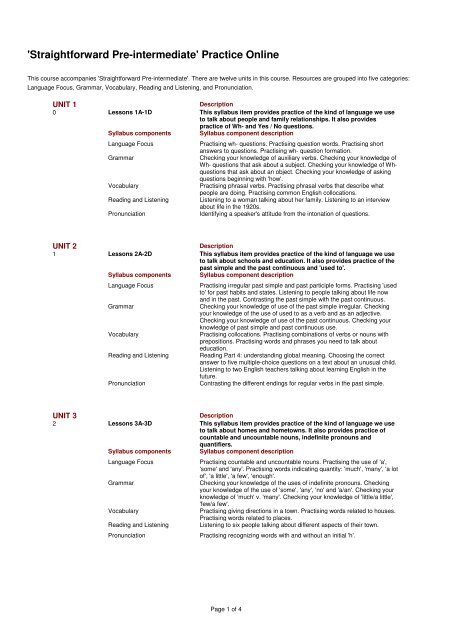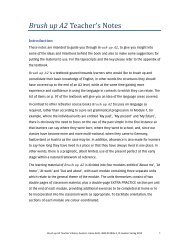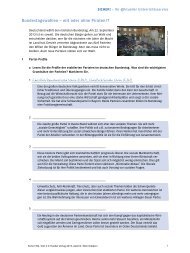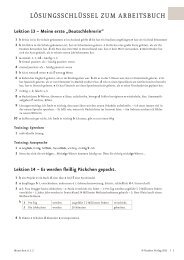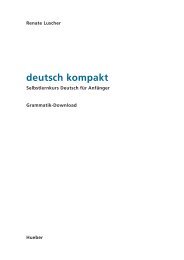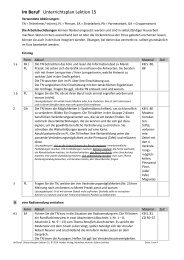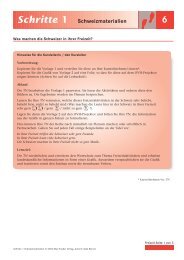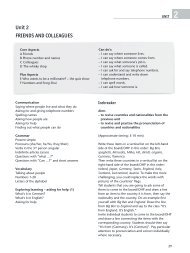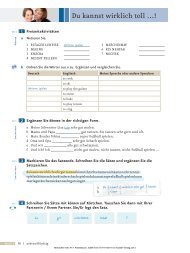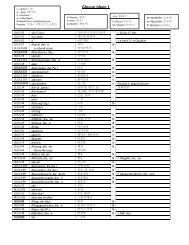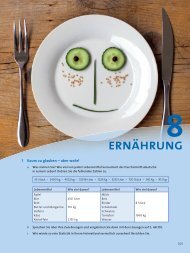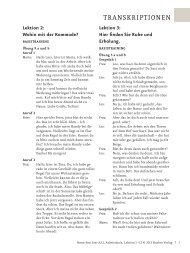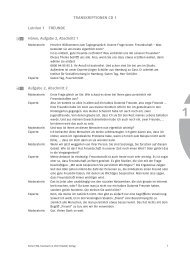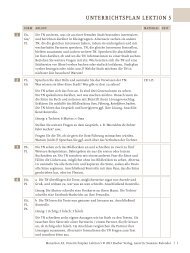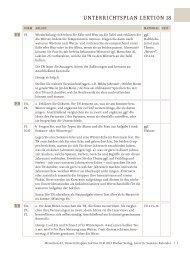'Straightforward Pre-intermediate' Practice Online
'Straightforward Pre-intermediate' Practice Online
'Straightforward Pre-intermediate' Practice Online
Create successful ePaper yourself
Turn your PDF publications into a flip-book with our unique Google optimized e-Paper software.
<strong>'Straightforward</strong> <strong>Pre</strong>-<strong>intermediate'</strong> <strong>Practice</strong> <strong>Online</strong><br />
This course accompanies <strong>'Straightforward</strong> <strong>Pre</strong>-<strong>intermediate'</strong>. There are twelve units in this course. Resources are grouped into five categories:<br />
Language Focus, Grammar, Vocabulary, Reading and Listening, and Pronunciation.<br />
UNIT 1<br />
Description<br />
0 Lessons 1A-1D This syllabus item provides practice of the kind of language we use<br />
to talk about people and family relationships. It also provides<br />
practice of Wh- and Yes / No questions.<br />
Syllabus components Syllabus component description<br />
Language Focus<br />
Grammar<br />
Vocabulary<br />
Reading and Listening<br />
Pronunciation<br />
Practising wh- questions. Practising question words. Practising short<br />
answers to questions. Practising wh- question formation.<br />
Checking your knowledge of auxiliary verbs. Checking your knowledge of<br />
Wh- questions that ask about a subject. Checking your knowledge of Whquestions<br />
that ask about an object. Checking your knowledge of asking<br />
questions beginning with 'how'.<br />
Practising phrasal verbs. Practising phrasal verbs that describe what<br />
people are doing. Practising common English collocations.<br />
Listening to a woman talking about her family. Listening to an interview<br />
about life in the 1920s.<br />
Identifying a speaker's attitude from the intonation of questions.<br />
UNIT 2<br />
Description<br />
1 Lessons 2A-2D This syllabus item provides practice of the kind of language we use<br />
to talk about schools and education. It also provides practice of the<br />
past simple and the past continuous and 'used to'.<br />
Syllabus components Syllabus component description<br />
Language Focus<br />
Grammar<br />
Vocabulary<br />
Reading and Listening<br />
Pronunciation<br />
Practising irregular past simple and past participle forms. Practising 'used<br />
to' for past habits and states. Listening to people talking about life now<br />
and in the past. Contrasting the past simple with the past continuous.<br />
Checking your knowledge of use of the past simple irregular. Checking<br />
your knowledge of the use of used to as a verb and as an adjective.<br />
Checking your knowledge of use of the past continuous. Checking your<br />
knowledge of past simple and past continuous use.<br />
Practising collocations. Practising combinations of verbs or nouns with<br />
prepositions. Practising words and phrases you need to talk about<br />
education.<br />
Reading Part 4: understanding global meaning. Choosing the correct<br />
answer to five multiple-choice questions on a text about an unusual child.<br />
Listening to two English teachers talking about learning English in the<br />
future.<br />
Contrasting the different endings for regular verbs in the past simple.<br />
UNIT 3<br />
Description<br />
2 Lessons 3A-3D This syllabus item provides practice of the kind of language we use<br />
to talk about homes and hometowns. It also provides practice of<br />
countable and uncountable nouns, indefinite pronouns and<br />
quantifiers.<br />
Syllabus components Syllabus component description<br />
Language Focus<br />
Grammar<br />
Vocabulary<br />
Reading and Listening<br />
Pronunciation<br />
Practising countable and uncountable nouns. Practising the use of 'a',<br />
'some' and 'any'. Practising words indicating quantity: 'much', 'many', 'a lot<br />
of', 'a little', 'a few', 'enough'.<br />
Checking your knowledge of the uses of indefinite pronouns. Checking<br />
your knowledge of the use of 'some', 'any', 'no' and 'a/an'. Checking your<br />
knowledge of 'much' v. 'many'. Checking your knowledge of 'little/a little',<br />
'few/a few'.<br />
Practising giving directions in a town. Practising words related to houses.<br />
Practising words related to places.<br />
Listening to six people talking about different aspects of their town.<br />
Practising recognizing words with and without an initial 'h'.<br />
Page 1 of 4
UNIT 4<br />
Description<br />
3 Lessons 4A-4D This syllabus item provides practice of the kind of language we use<br />
to talk about personal relationships. It also provides practice of the<br />
present simple and the present continuous and prepositions of time.<br />
Syllabus components Syllabus component description<br />
Language Focus<br />
Grammar<br />
Vocabulary<br />
Reading and Listening<br />
Pronunciation<br />
Practising the present simple. Contrasting the present simple and present<br />
continuous. Practising recognition of the verbs that are not normally used<br />
in the continuous forms. Practising the prepositions of time 'in', 'on' and<br />
'at'. Practising mixed prepositions.<br />
Checking your knowledge of stative verbs. Checking your knowledge of<br />
adverbs of frequency. Checking your knowledge of adverbial expressions<br />
of frequency. Checking your knowledge of the use of the prepositions of<br />
time 'at', 'on', 'in', 'by' and cases when no preposition is used.<br />
Practising phrasal verbs used to talk about relationships. Practising<br />
phrasal verbs with 'get'.<br />
Listening to a radio interview with a film star.<br />
Practising long and short vowels. Practising contrasting the different<br />
sounds for words spelt with 's'.<br />
UNIT 5<br />
Description<br />
4 Lessons 5A-5D This syllabus item provides practice of the kind of language we use<br />
to talk about holidays and travelling. It also provides practice of<br />
future forms: 'will' and 'going to' and the language of requests and<br />
permission.<br />
Syllabus components Syllabus component description<br />
Language Focus<br />
Grammar<br />
Vocabulary<br />
Reading and Listening<br />
Pronunciation<br />
Practising the future with 'will' and 'won't'. Contrasting the use of 'will' and<br />
'going to'. Practising 'will' and 'going to'. Contrasting 'will', 'won't' and<br />
'going to'. Practising making offers and requests. Practising the modal<br />
verbs 'can', 'could' and 'may'.<br />
Checking your knowledge of when to use the future with 'will/won't'.<br />
Checking your knowledge of the different uses of the future with 'going<br />
to'. Checking your knowledge of how to use 'can' and 'may'.<br />
Practising to a conversation about pony-trekking. Practising verbs and<br />
nouns for holiday activities. Practising words related to travel. Practising<br />
words used to talk about airports.<br />
Listening to someone talking about his trip to South America.<br />
Identifying polite or impolite intonation in requests.<br />
UNIT 6<br />
Description<br />
5 Lessons 6A-6D This syllabus item provides practice of the kind of language we use<br />
to talk about food. It also provides practice of comparatives and<br />
superlatives and modifiers.<br />
Syllabus components Syllabus component description<br />
Language Focus<br />
Grammar<br />
Vocabulary<br />
Reading and Listening<br />
Pronunciation<br />
Practising comparative and superlative adjectives. Practising superlatives.<br />
Practising comparatives and superlatives. Contrasting the use of 'too' and<br />
'enough'.<br />
Checking your knowledge of irregular comparatives. Checking your<br />
knowledge of the uses of emphasizers. Checking your knowledge of the<br />
uses of amplifiers. Checking your knowledge of the uses of downtoners.<br />
Practising the language used in restaurants when eating out with clients<br />
or contacts. Practising words and phrases used in cooking. Practising<br />
words related to eating and drinking.<br />
Listening activity you listen to three sets of information about food and<br />
complete a text. Reading Part 4: understanding details, attitudes and<br />
opinions and the purpose of a text by choosing the correct answer to<br />
questions about an article on 'greasy spoons' (cheap English cafés).<br />
Identifying the stress pattern in two- and three-syllable words.<br />
UNIT 7<br />
Description<br />
6 Lessons 7A-7D This syllabus item provides practice of the kind of language we use<br />
to talk about work, job applications and interviews. It also provides<br />
practice of the present perfect simple.<br />
Syllabus components Syllabus component description<br />
Language Focus<br />
Grammar<br />
Practising the present perfect. Practising present perfect questions.<br />
Practising word order with adverbs of time. Practising the past simple and<br />
the present perfect.<br />
Checking your knowledge of the present perfect affirmative. Checking<br />
your knowledge of the present perfect negative. Checking your knowledge<br />
of the use of the present perfect.<br />
Page 2 of 4
Vocabulary<br />
Reading and Listening<br />
Pronunciation<br />
Practising words and phrases used to talk about work. Practising words<br />
and phrases used to talk about skills and qualifications. Practising words<br />
and phrases commonly used in letters of application. Practising phrases<br />
often used in job interviews.<br />
Listening to a conversation about how people are selected for job<br />
interviews.<br />
Contrasting the vowel sounds /æ/ and /ʌ/ in sentences.<br />
UNIT 8<br />
Description<br />
7 Lessons 8A-8D This syllabus item provides practice of the kind of language we use<br />
to talk about the future. It also provides practice of the language<br />
used for making predictions.<br />
Syllabus components Syllabus component description<br />
Language Focus<br />
Grammar<br />
Vocabulary<br />
Reading and Listening<br />
Pronunciation<br />
Practising the use of future forms: 'will' and the present continuous.<br />
Practising the use of the present continuous. Practising the use of future<br />
forms. Practising the present continuous. Practising a variety of future<br />
tenses for predictions and assumptions.<br />
Checking your knowledge of using the present simple to talk about fixed<br />
future events. Checking your knowledge of the use of the present simple<br />
to talk about the future in subordinate clauses. Checking your knowledge<br />
of using 'can', 'could', 'may' and 'might' to talk about possibility. Checking<br />
your knowledge of adjectives + the infinitive.<br />
Practising words made up of two nouns. Practising everyday language.<br />
Listening to two English teachers talking about learning English in the<br />
future.<br />
Practising word stress.<br />
UNIT 9<br />
Description<br />
8 Lessons 9A-9D This syllabus item provides practice of the kind of language we use<br />
to talk about films and television. It also provides practice of the<br />
passive and adjectives ending in '-ed' and '-ing'.<br />
Syllabus components Syllabus component description<br />
Language Focus<br />
Grammar<br />
Vocabulary<br />
Reading and Listening<br />
Pronunciation<br />
Practising the present passive. Practising the past passive. Practising the<br />
use of active and passive voice. Practising '-ed' and '-ing' adjective<br />
endings.<br />
Checking your knowledge of the present simple passive form. Checking<br />
your knowledge of the past simple passive form. Checking the use of 'by'<br />
+ agent in passive sentences. Checking your knowledge of the use of the<br />
agent in passive sentences. Checking your knowledge of adjectives<br />
ending in -ed and -ing and adjectives ending in '-ed' followed by a<br />
preposition.<br />
Placing adjectives in the correct order and help the cinema manager<br />
advertise his films. Practising names of types of TV programmes.<br />
Listening to a radio competition about film trivia. Reading a text about<br />
famous pets.<br />
Distinguishing between words which contain diphthongs and words which<br />
don't.<br />
UNIT 10<br />
Description<br />
9 Lessons 10A-10D This syllabus item provides practice of the kind of language we use<br />
to talk about health and fitness. It also provides practice of the<br />
present perfect with adverbs of time.<br />
Syllabus components Syllabus component description<br />
Language Focus<br />
Grammar<br />
Vocabulary<br />
Reading and Listening<br />
Pronunciation<br />
Practising the prepositions of time 'for' and 'since' and the adverb of time<br />
'ago'. Practising the present perfect with 'for' or 'since'. Practising 'for' and<br />
'since' with the present perfect. Practising word order with adverbs of time.<br />
Checking your knowledge of the use of the prepositions of time 'for' and<br />
'since'. Checking your knowledge of the difference between the use of the<br />
past simple and the present perfect.<br />
Practising collocations. Practising words for different types of health<br />
problems. Practising the correct use of words and the understanding of a<br />
text about health and safety in the workplace.<br />
Listening to two teenagers talking about a healthier lifestyle.<br />
Contrasting the vowel sounds /ɔ:/ and /ɜ:/ in single words.<br />
Page 3 of 4
UNIT 11<br />
Description<br />
10 Lessons 11A-11D This syllabus item provides practice of the kind of language we use<br />
to talk about fashion. It also provides practice of modals of<br />
obligation and the infinitive to express purpose.<br />
Syllabus components Syllabus component description<br />
Language Focus<br />
Grammar<br />
Vocabulary<br />
Reading and Listening<br />
Pronunciation<br />
Practising the modal verbs 'must / mustn't'. Practising the modal verbs<br />
'mustn't' and 'don't have to'. Practising the modal verbs 'mustn't', 'don't<br />
have to', 'don't need to' and 'needn't'. Practising the modal verbs 'must',<br />
'can' and 'needn't'.<br />
Checking your knowledge of the use of 'have to' to talk about obligation.<br />
Checking your knowledge of 'must' and 'have to'. Checking knowledge of<br />
using 'mustn't' and 'don't have to' to talk about obligation and necessity.<br />
Checking your knowledge of the form and uses of the infinitive.<br />
Practising words related to technology and clothes. Practising<br />
expressions that are useful when shopping. Practising finding the<br />
meaning of definitions.<br />
Reading to extract the main points made in a text about shoppers and<br />
retail companies. Listening to an interview about fashions in the 60s and<br />
70s.<br />
Practising the sounds /θ/ and /ð/.<br />
UNIT 12<br />
Description<br />
11 Lessons 12A-12D This syllabus item provides practice of the kind of language we use<br />
to talk about the world and global issues. It also provides practice of<br />
relative clauses and prepositions of movement.<br />
Syllabus components Syllabus component description<br />
Language Focus<br />
Grammar<br />
Vocabulary<br />
Reading and Listening<br />
Pronunciation<br />
Practising prepositions of movement and verbs used for describing<br />
movement. Practising relative pronouns.<br />
Checking your knowledge of the prepositions of place 'into/out of',<br />
'onto/off', 'over/under', 'to/from' and 'up/down'. Checking your knowledge<br />
of the prepositions of movement 'across', 'along', '(a)round', 'past' and<br />
'through'. Checking your knowledge of relative pronouns. Checking your<br />
knowledge of the omission of object pronouns in relative clauses.<br />
Checking your knowledge of the differences between British and<br />
American English vocabulary. Checking your knowledge of preposition<br />
use in British and American English.<br />
Practising the use of nationality nouns and adjectives.<br />
Listening to somebody talk about changed arrangements.<br />
Identifying the main syllable stress in countries and nationalities.<br />
Page 4 of 4


